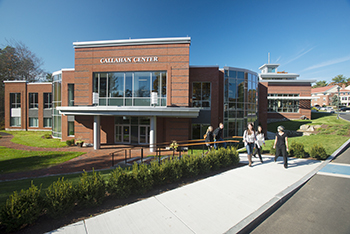Ensuring a Successful Campus Construction Project
 A modern student center, a high-tech science wing, a classroom filled with natural light — these are the features that make each school or university campus distinctive. Just as graduation is achieved through a long process of study and hard work, the facilities inhabiting a campus are the result of a long process of master planning, fundraising and construction.
A modern student center, a high-tech science wing, a classroom filled with natural light — these are the features that make each school or university campus distinctive. Just as graduation is achieved through a long process of study and hard work, the facilities inhabiting a campus are the result of a long process of master planning, fundraising and construction.
Each phase of this process is accompanied by its own set of challenges, and construction creates many that are highly visible and impactful. When that first shovel hits the ground, it is incumbent upon school or university officials to ensure the project does not compromise the campus, detract from the student experience or deter prospective applicants.
But these challenges can be addressed. Successful campus building begins with a solid foundation of communication and camaraderie, scheduling and integration (not separation) between the school administration and construction team. Building a strong relationship with your construction manager or contractor can make all the difference.
Communication & Camaraderie
Having a builder on board that maintains fluid communication channels with your school is the most important feature of any campus project. Sharing an open-book process with your builder and staying invested in all the details ensures there are no surprises at any point for either party.
Be sure to select a builder you feel comfortable with and perceive as a good fit with the campus culture. Camaraderie within the project team is essential to facilitate an open dialogue where your institution’s needs and concerns are heard. Consistent daily check-ins, weekly meetings and site walks hosted by the project team are a great way to streamline essential information.
Recently completed by Beverly, Mass.-based Windover Construction, the Endicott College Callahan Center project in Beverly exemplifies how well-defined communication channels can easily trump construction challenges. A rehabilitation of an occupied building, the project encountered multiple unforeseen conditions that threatened to stall progress. Windover and the college successfully managed these obstacles through timely discussions of identified risks and action plans to resolve them. This allowed a project destined for delays to finish on time.
Just-In-Time Project Scheduling
Work with your builder to cultivate as much information as possible about your typical campus behavior, such as traffic patterns, pedestrian flow and occupancy. Having a builder understand your campus allows that builder to develop a meticulous schedule sequence that accommodates campus activities. Take the Callahan Center again as an example. As the sole campus dining facility, the Callahan Center had to stay open throughout construction to provide meal service. Windover carefully staged work so that one area was completed before moving onto the next. This allowed access to the facility despite construction wrapping around all exterior walls of the existing structure.
Similarly, Windover recently completed a lower school and dining addition at Brookwood School in Manchester, Mass., where construction wrapped around occupied classrooms. A just-in-time schedule allowed learning and activities such as student pickup or drop-off to continue uninterrupted despite the proximity to construction.
Use Your Imagination
You cannot ignore construction, so rather than making it the elephant on your campus, embrace it and encourage students to do the same. This change in perception harmonizes the relationship between “them” (the builders) and “you” (the school) and makes it about “us” sharing the experience.
At Brookwood, construction became a part of the students’ curricula. Students toured the construction site, interviewed the workers and created weekly video reports. At St. John’s Preparatory School in Danvers, Mass., where Windover is constructing a STREAM building and middle school, students are reinforcing their classroom learning by applying disciplines such as mathematics, environmental sciences and physics to the construction site.
The landscape for campus construction is clearly changing. It is not just about getting to the end product; it is about embarking on an enriching process that engages teamwork and planning. It’s about a partnership that makes the final result distinctly you.
Stuart Meurer is vice president of Windover Construction, a construction management firm headquartered in Beverly, Mass. The firm specializes in creating sophisticated commercial and institutional spaces and refined custom homes throughout New England. For additional information, call 978-526-9410, visit the company website at www.windover.com or email info@windover.com.
